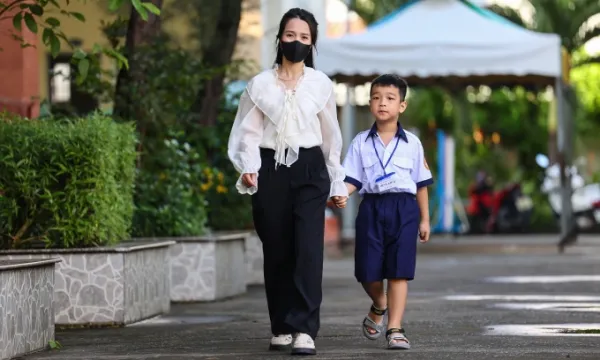
“If forcing my son to study counts as a violation, I’d have to sell my house to pay the fines,” Thao, 35, of Hanoi says half in jest.
Every night she struggles with her son, who is in second grade, until nearly midnight so that he finishes all the homework. “If I don’t sit next to him, he won’t write a single line.”
When she pushes him the boy rushes through his work, and she makes him rewrite things neatly even if it means sitting well past bedtime. “He cries wanting to sleep, and I end up roaring like a tiger.”
At times she takes it easy only to receive a private message from the teacher urging her to “push her child harder.” “If the teacher wants me to stop forcing him, she should give him less homework.”
|
Parents accompany students to the academic year opening ceremony at Bui Van Moi Primary School in Phuoc Long Ward, Ho Chi Minh City, September 2025. Photo by Read/ Quynh Tran |
A new decree that takes effect on Dec. 15 makes any act of coercing a family member to “study excessively” punishable with fines of VND 5–10 million (US$200–400).
In Nghe An Province, Nguyen Hanh Phuc, 34, has the same anxiety as Thao. She says: “I was reading about the decree when my daughter walked in. I quickly closed the tab, afraid she’d see it and use it as an excuse not to study.”
Her daughter prefers playing and often complains of headaches or fatigue when it is time to sit down with her books, she says. “If she finds out about this law, she’ll probably fake fainting and call the police on me,” she laughs.
What troubles parents most is the vague definition of “studying beyond one’s ability.” Phuc says: “Every child is different. If I don’t scold mine, he won’t even touch a pen. If that means I could be fined, my salary won’t be enough.”
A social media thread discussing the new rule has drawn more than 4,500 comments. The most liked opinion reads: “Before fining parents, fine teachers for giving too much homework.”
Experts say parents are often a major cause of student stress. A three-year study involving more than 600 junior secondary students found children’s stress levels to be in direct proportion to their parents’ education level and expectations, especially fathers’.
The higher the goals, the greater the anxiety and fear of failure. A 2021 UNICEF Vietnam study also found that many students felt exhausted and feared disappointing their parents when they failed to meet expectations.
Le Hoang Phong, a doctoral researcher in educational leadership at University College London in the U.K., says being forced to study affects the source of motivation rather than the result.
Parents pressure their children because they feel insecure in a society that measures worth by grades, he says. He points to the Self-Determination Theory in psychology, saying “True motivation must come from within, not from orders.
“The regulation should not only punish but rebuild trust, helping parents understand that real love lies not in how much their children study, but in how safe they feel while learning.”
 |
|
Students before the high school entrance exam in Hanoi, June 2025. Photo by Read/ Le Tung |
Experts warn the new penalties could backfire if applied rigidly. Academic pressure stems from broader society, not just families.
In countries like China and Singapore, grades remain the “passport to success,” unintentionally amplifying parental pressure.
Others like the UK and the US invest heavily in social-emotional learning and parenting education programs, helping parents support children more effectively.
Dr. Cherry Vu (Vu Anh Dao), author of “Can I Just Throw My Kid Away?” who now lives in New Zealand, agrees the decree is rigid but appreciates its goal of seeking to prevent emotional abuse, including academic coercion.
“Most parents don’t mean to harm their children. They just don’t realize that ‘loving through expectations’ can become a burden. Regulations should focus on education and support, not only punishment.”
Tran Thi Ngoc Nu, a lawyer and head of Tri Viet Law Office in Ho Chi Minh City, says an upcoming circular will clarify what “studying beyond ability” means so that families and schools understand their rights and responsibilities.
Phuc says with evident unhappiness: “Now even at home, trying to help my child improve could cost me a fine.”
-
Do not take children’s cough lightly, expert gives 5 precautions

-
If there is lack of blood in the body, then start eating 5 things; Amazing results will be seen in just 15 days

-
Chef Ranveer Brar’s advice on the right way to make tea

-
‘I’m a Democrat in love with a Republican’: Meet the couples who are part of a dying breed

-
Delhi shaken by explosion near Red Fort, Kejriwal’s statement in headlines!
